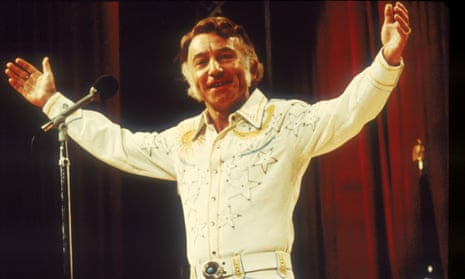“This isn’t Dallas, it’s Nashville! SING!” The desperate speaker is rhinestone-suited old-time country singer Haven Hamilton, played by Henry Gibson, in this rereleased state-of-America ensemble classic from 1975, written by Joan Tewkesbury and directed by Robert Altman. The toupee-wearing star has just been shot in the arm by a lone gunman in the crowd at a political rally featuring wholesomely patriotic country music, and the crowd is on the verge of panic. Only soothing tunes will calm them, and eventually a sprightly number called It Don’t Worry Me finally gets them singing along, forgetting all about the murder attempt they’ve all just witnessed. (Like Scorsese’s Taxi Driver, from a year later, this is a movie that is attempting to deal with the trauma of the Kennedy assassination as much as, or more, than the Vietnam war.)
It’s an appropriately sensational and bizarre set piece to close this unique film and, watching it again for the first time since its last revival 17 years ago, what strikes me is its complex attitude to country music itself. Nashville is of course the home of country, the home of the Grand Ole Opry; the music is not really ironised in this film, not mocked, even when the singers are at their most narcissistic and self-serving and when the songs are at their cheesiest – especially Hamilton’s toe-curling For the Sake of the Children, a mawkish song from a man to his mistress, piously saying he has to return to his marriage. The music, playing almost continuously, is the glue that holds the movie together. It may sound schmaltzy, but the city-slickers deriding it sound worse.
This is Gerald Ford’s America, on the verge of the bicentennial in 1976 … an event everyone hopes will heal the agonies of Watergate. An independent presidential candidate is coming to Nashville, hoping to promote his new ideas: taxing churches, abolishing the electoral college, removing lawyers from government. But for some Kennedy lovers present, the final dismissal of Nixon just brings back unhappy memories of how Nixon actually won against Kennedy in Tennessee in 1960, and the Kennedy motif is an unhappy omen.
So too is a public fainting fit suffered by the local country star Barbara Jean (Ronee Blakley), who has perhaps intuited the hysteria and anxiety in the air. Allen Garfield is great as her boorish husband-slash-manager Barnett. Geraldine Chaplin is insufferably patronising British journalist Opal, who has a fling with handsome singer Tom (Keith Carradine), who is also having an affair with Linnea (a superb Lily Tomlin), with whom Wade (Robert DoQui) is poignantly in love. Linnea is an unsatisfied married woman with hearing-impaired children whose sleazy husband Delbert (Ned Beatty) is working with visiting TV producer John Triplette (Michael Murphy) to set up a lucrative media-political deal. All these – and many more – characters’ lives crisscross, their dialogue overlapping in the middle-distance sound design while the candidate’s megaphone-van trundles around the city, blaring its choric political commentary, an ambient effect rather like the tannoy announcements in M*A*S*H.
The film’s most brutal moment is the treatment of Sueleen Gay, the waitress and tone-deaf wannabe country star played by Gwen Welles, who is tricked by the unspeakable Delbert and Triplette into appearing on stage, purely because they want her to do a striptease for the braying good ol’ boys present. Poor Sueleen thinks they wanted to hear her sing. It’s an ugly moment of abuse and, perhaps tellingly, the band switch from wholesome country to traditional burlesque music for this humiliation.
Altman’s control of this sprawling material is wonderful – though Tewkesbury’s screenwriting achievement should not be forgotten. This is the heart of the troubled mid-70s American zeitgeist: angry, sentimental, violent, comic, afraid.

Comments (…)
Sign in or create your Guardian account to join the discussion